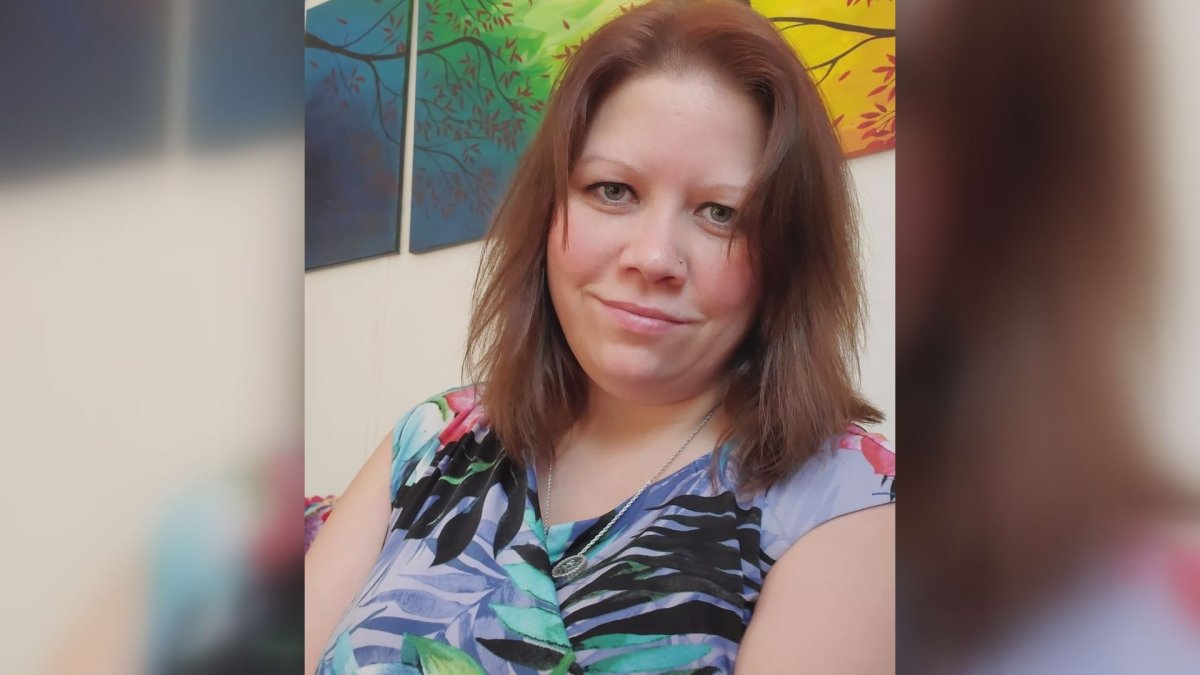Warning: This story contains content that may be disturbing to some readers. Discretion is advised.

Amy Rennie, an Oakland, N.B. resident, was admitted to hospital in crisis earlier this week.
“I called the ambulance on myself due to having suicidal thoughts,” she tells Global News. “And I was very scared to be left alone because I couldn’t control them.”
Rennie, who lives with borderline personality disorder, bipolar disorder, PTSD, severe anxiety and depression, says it was a discouraging experience.
After being admitted to the hospital, the 37-year-old was seen by a few different health-care workers throughout her hours-long stay.
Eventually, she was able to speak with a psychiatrist over Zoom.
She says she wanted to be placed on a 72-hour suicide watch, but was instead referred to the region’s mobile crisis unit for a followup.
“I said, ‘Fine, I don’t know what that is, but OK,'” she says. “So he explained mobile crisis; he said mobile crisis is somebody who will call me two to three times a day for the next three weeks to make sure I’m safe and that I’m doing OK.”
After that, she left the hospital, concerned about her level of treatment.
Mobile crisis check-in
She did receive a call from a counsellor and a check-in call from the local mobile crisis team, she says, but was told the onus would be on her moving forward to call them instead.

Get weekly health news
Rennie says she had a pleasant call with the mobile crisis representative, but that “he said that mobile crisis does not call out, people call them.”
“And I said, ‘Well, the odds of me calling are very rare because when I’m in crisis, the last thing I’m going to do is reach out and try to ask people for help,'” Rennie recalls.
According to a statement from Jean Daigle, VP community for the Horizon Health Network, “Horizon’s Mobile Crisis Unit in the Upper River Valley region does perform check-in requests for clients as a follow-up when requested.”
“It is our standard process during that initial check-in to suggest to the client that they call us back when needed. We want individuals to know that they can reach out to us when it meets their needs,” the statement says.
It goes on to say a daily check-in could be performed at the request of a physician or clinician, but that is not “standard practice” unless they are unable to reach the person.
Provincial recommendations
Global News asked the Department of Health if it is OK for people who are experiencing suicidal thoughts to have the responsibility to make those calls.
Bruce Macfarlane, a spokesperson for the department, says while some individuals might make calls to preferred service providers, every situation is different.
“We do recognize that it can be difficult to make that call and to have a better connection for those individuals is key,” he says in a statement.
The province recently committed to implementing 21 recommendations relating to its mental health crisis and addictions response.
Macfarlane pointed to a “key recommendation” to “standardize the follow-up care process for all individuals presenting to the emergency department with addiction and mental health concerns.”
“A ‘warm hand-off’ approach is key to success,” he says. “This recommendation is intending to ensure that the individual is not leaving the Emergency Department with a phone number to call, but rather to be able to provide an appointment time or a connection to the community resources directly.”
He says the province continues to encourage people to contact community services as needed.
Avoiding similar situations
Rennie says she’s feeling better now, but it’s “day by day.”
She hopes speaking out will help better prepare the system next time someone is in distress.
“That’s all I could ask for, just to help one person to feel that they’re heard and get real help that they really are asking and begging for,” she says.
“I just … I want to make sure that this doesn’t happen to somebody else.”
If you or someone you know is in crisis and needs help, resources are available. In case of an emergency, please call 911 for immediate help.
Crisis Services Canada’s toll-free helpline provides 24-7 support at 1-833-456-4566.
CHIMO hotline (New Brunswick): 1-800-667-5005









Comments